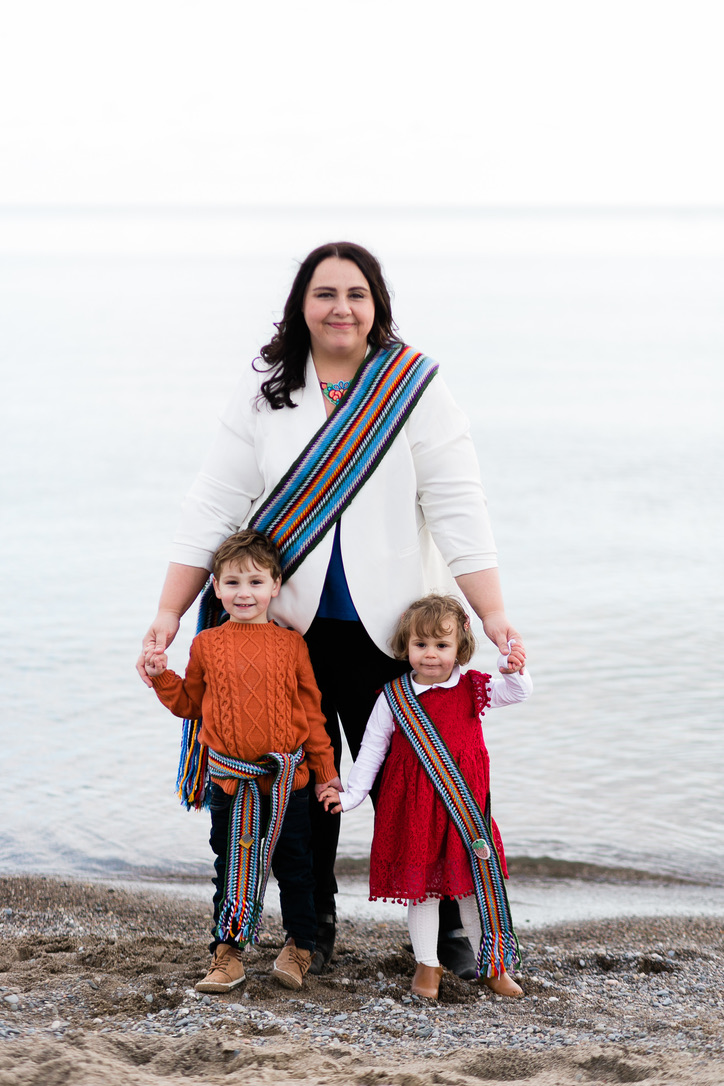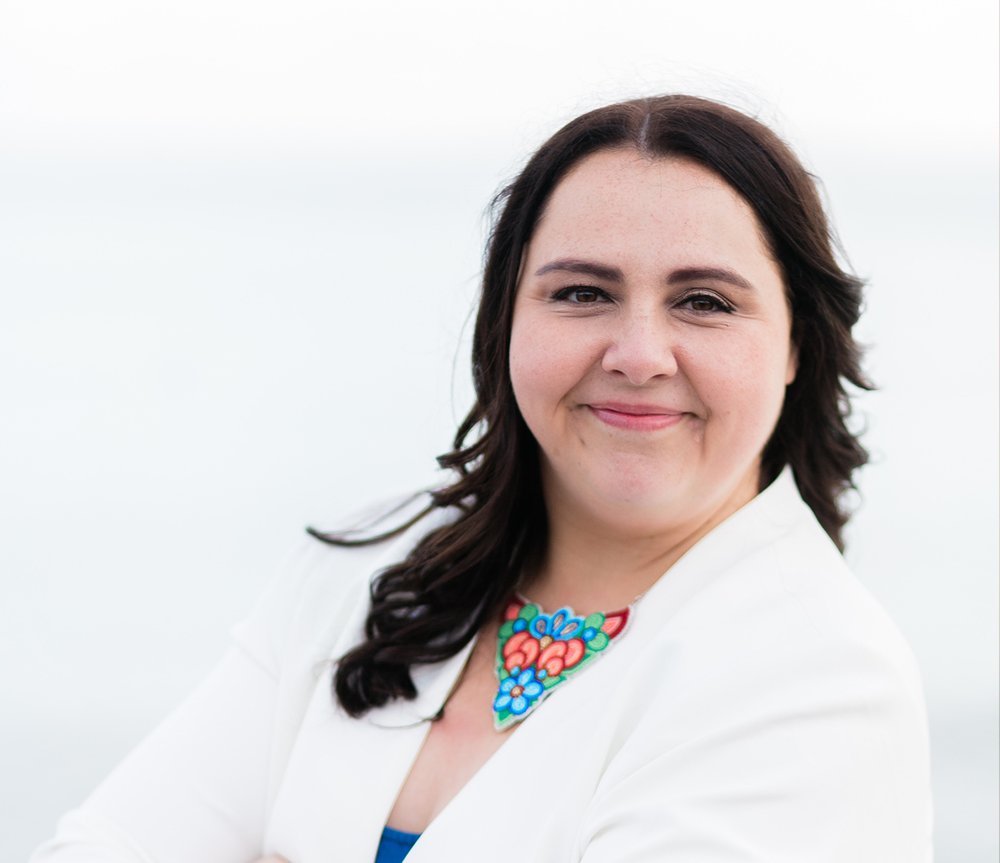Our spirits are journeying here to learn things for a reason
Tera Beaulieu
Tera Beaulieu is a citizen of the Métis Nation of Ontario, who also has Hungarian and Ukrainian ancestry. Tera founded the Weaving Wellness Centre in March of 2020 and practises as a registered psychotherapist. She is mum to Beau and Aurora and she currently sits as the Region 8 Women’s Representative with the MNO’s Women’s Council. Since the start of the pandemic, Tera and associates at the Weaving Wellness Centre have been facilitating the TYRMC’s Mental Health workshops and Sharing Circles.
Q1: Can you share a bit about your Métis roots?
My Métis ancestry comes from my dad’s side from St. Laurent, Manitoba, and Qu’Appelle, Saskatchewan. The journey of understanding or even knowing of our connection to our Métis ancestry was a bit of a confusing one. Part of me knows that my dad knew that my grandfather was Métis, but then something happened where there was a real generational gap, where my dad never identified as Métis when I was growing up. We were always told that we were part French-Canadian, but my dad would always make these references to Indigenous culture and people. For example, when I was young I used to make these bracelets out of embroidery thread and my dad made this comment one time where he said “well, you know how to do that because of me.” Since I was quite young, I never thought to ask what that meant and it wasn’t until I was in university and was really drawn to Indigenous people, research projects, and courses that I started to ask a lot of questions. I wound up getting this document that mapped out my great grandmother’s entire family line and several people in my class suggested that I take a pause and start exploring this more because there were a lot of well-known names of Indigenous community members in my family history and tree. Long story short, I started to ask questions of my aunts and uncles, particularly my oldest uncle. I said to him “Oh, well I know we’re part French, right?” and he was like “We’re not French-Canadian, we’re Métis.” That sparked this journey of unpacking, researching, discovering, and volunteering, to the point where I probably know the most about our family history now!
Q2: What has been your involvement with the MNO/TYRMC thus far? After I learned about our history and identified as Métis, I hit a lot of barriers to engaging with the Métis community of Toronto. There was a Toronto Council, but their focus at that time was centered on the political happenings of the MNO and there weren’t the events and community engagement that we have now. I remember going to one of the Council meetings at Miziwe Biik and meeting one of my very best friends now, Christine Skura, who was the Youth Rep. on the Toronto Council at the time. We talked about how there really wasn’t anything going on in the city, visibly, at that time for Métis people. A big changing factor for me was when the MNO’s Infinite Reach Program got started. I was part of the first cohort of the Infinite Reach Program and the first UofT Infinite Reach Facilitator. That experience was really pivotal and transformative because it gave me a platform to organize cultural events and bring community together. Eventually, I joined the TYRMC Council as their Women’s Rep. and after about a year I ran for Council President and was the TYRMC President for just under 5 years.
Q3: What do you like about the TYRMC community?
I have an interesting perspective because I’ve seen it grow so much over time. While I was Council President, it was really powerful to see community develop, where you start to see the same people come to events and notice how they start to feel a sense of belonging there. We have people from all walks of life with amazing skill sets who are so talented and we all share this thing in common, which is part of ourselves, our identity as Métis people. It’s really amazing to see how all of those unique gifts and abilities start to take shape and form, and I think the success of the Council has been dependent in large part, on who has been on it and volunteered and done that work. The Council from my perspective is really like the beating heart, at least in Toronto, of the Métis community.
Q4: What brought you to start the Weaving Wellness Centre?
I started the practice for a couple of reasons. One, there’s been this long-term vision that I’ve been slowly moving towards across time; even when I was young I was drawn to psychology and I knew I wanted to pursue that. I always imagined working as a therapist and being a helper in that way. Before starting the Weaving Wellness Centre, I talked with close friends, especially Métis friends, and I got a lot of support from them around my vision to create this space and this practice for Métis people that centers their mental health and healing needs, because I don’t see that existing anywhere else. I’ve worked in a lot of other kinds of hospital and community settings with pan-Indigenous programming where I found myself thinking “Why am I doing this work when I could be doing so much more for my people?” where I could be doing work that feels impactful and meaningful. I don’t want to have to work under the restraints of somebody else in terms of program development, creating resources, or offering therapy to Indigenous people. I don’t want to go through these systems and hierarchies of power to do that. So, I decided it was time to start this up on my own, with the support of community, and now here we are!
Q5: What and/or who inspires you?
I think my children are my main inspiration. I’m trying to raise them in a way that’s different from how I was raised, in the sense of understanding this part of themselves as a Métis person. Understanding what Métis culture is, what community is, and really accessing and paving those pathways so that they grow up knowing exactly who they are and what this all means. I’m really trying to do things for them, my grandchildren, great-grandchildren and so on. I’m also super inspired by my own ancestors and their resilience in having survived a genocidal history and many different attempts and attacks to erase them. The fact that they persevered, somehow, and they survived all of that so that I could be here today, it’s very inspiring for me. Thinking about the past and the future really centres me in a lot of the work that I do.

Q6: Are there any Métis or Indigenous teachings that you are holding close these days?
We’ve been in a difficult stretch of time and we’ve lost a lot of people, not just Métis people but as humans in general, over the course of Covid. One teaching that I’ve had in my mind a lot is that we have picked this time to be here for a reason, as spirits. We have elected to journey through this experience of Covid and loss and ecological disaster, and so on, for a reason. I don’t know why my spirit picked this time but it did. Our spirits select when they leave and the timing of when we exist and I’ve been reflecting a lot on that. Especially when it comes to environmental disaster and the problems we are navigating right now as a species. It gives me a lot of comfort to hold these beliefs and teachings because otherwise there’s just fear and hopelessness around what the future holds. Our spirits are journeying here to learn things for a reason; there is a grander purpose to what’s happening now in our world. I think about my children a lot and what their life is going to look like and I have to hold faith that they also knew why they were coming here when they did.
When I went to the Vatican to provide mental health and wellness support to the Métis Delegation meeting with Pope Francis in March 2022, there were a lot of teachings that were shared. On the final morning Regional Chief Gerald Antoine shared some teachings that included the message that we should not doubt for a moment that we were meant to be there. He thanked our children, our parents, our grandparents, all of the little ones that are coming, and our ancestors who got us to this exact moment in time. Everyone who was there was supposed to be there and our ancestors have been working to get us to this moment in time. So you know, when I think about the meaning of my life, in the middle of a pandemic when so many other people have died, I have to believe that my gifts are still meant to be used here, I’m still meant to be doing this work and having an impact through helping work, and my spirit is still needing to learn whatever it needs to learn.
Q7: What’s bringing you joy these days?
For me, I experience joy in those moments of being really fully present, especially with my children, where I’m not stressed or rushing or distracted, just fully present in the moment. Where I can just stop and be completely attuned to them or an activity that we’re doing, or find myself in these deep profound moments of gratitude. When I think of joy, an offshoot of joy for me is when we feel full and nourished, like the spirit is well fed and we feel like we’re living our life in alignment with what we are meant to be doing here. One of these moments where I recently felt very fulfilled is when I was in Italy with our Métis community from across the Homeland. I had just met these people but forged such strong relationships with them, and those relationships were so nourishing for my spirit, because I hadn’t sat in community and visited with people for a long time as a result of Covid.
To learn more about Tera’s role as the Women’s Rep. for Region 8, visit https://www.mnowc.com/region-8
The Weaving Wellness Centre
Website: https://www.weavingwellness.ca/
Instagram: https://www.instagram.com/weavingwellnesscentre/?hl=en

